Hello! This is Yasmin again coming back with another blog. This time I will share my complete experience in detail about going to Kiruna up north of Sweden for 2 days and 1 night! Some of you may have already seen some of my stories on our @studyatuu Instagram, and I got a lot of exciting responses and questions in detail about the trip. Of course, being a student we always have a tight budget to make sure that every trip we made should be affordable enough and worth every penny! That’s why I decided to share it in detail here in the blog to inspire you to go at least once in your life up to the north of the Arctic Circle!
Why Kiruna?
Kiruna has always been long known as one of the northest most populated cities in Sweden with a population of around 20 thousand inhabitants due to the biggest modern Iron Mine Industry, which means that it has a big tourist attraction potential especially in winter notably the infamous original ICE HOTEL that they build every winter season from blocks of ice. Other than that, tourists usually come here to do many winter activities like wolf sledding, cross-country skiing, snowmobiling, and spending the night in the wilderness while wishing to see the Aurora Borealis at a higher chance. It is also close to Abisko National Park and near the border to Narvik, Norway on one train line.
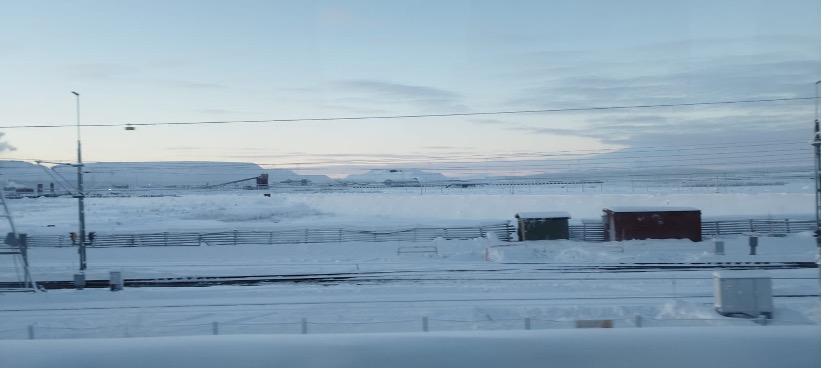
What Tour Package to Book?
Luckily, I got this recommendation from a friend who showed me a poster of a Kiruna Open Trip tour organizer. Actually, there are a couple of tour organizers who posted their posters on many Uppsala University campus information walls you might stumble upon when entering your faculty building. It’s a pretty popular tour organizer among Uppsala students as I see a lot of people from Uppsala during my Trip. Overall the one that I picked has everything included during the stay in Kiruna. From transport from/to Kiruna station or airport, the accommodation, full meals, winter boots with pants, and lots of winter activities to choose from. I booked a 2-day tour for 1600 SEK per person! (Student price, International student ID acceptable). If you manage to have a group of 5 people they will give you more discounts. The tour organizer basically has their own cabin property in the middle of the wilderness near the frozen river 10 km from the edge of Kiruna City Road only accessible by snowmobile. If you are not keen on a tour organizer, you can always check on TripAdvisor to customize your trip plan before reaching Kiruna.
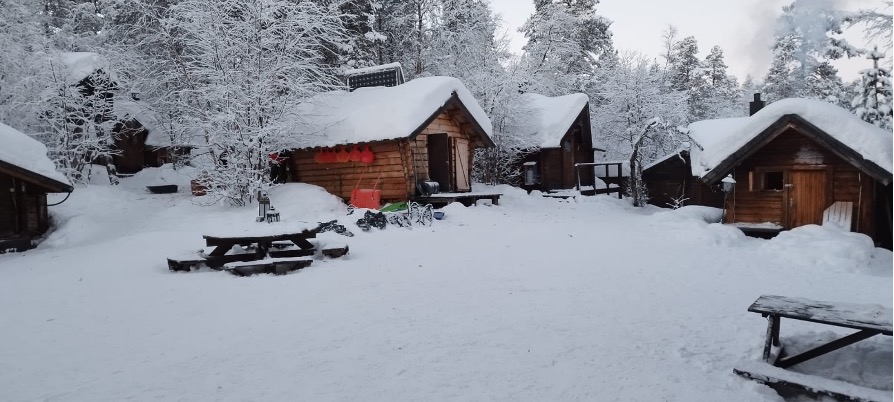
Pro Tip to Plan your trip:
- Do not come there unplanned. It is advisable that you do this activity around December – March when the snow piling up. The end of December to January is the coldest month when the rivers are completely frozen. December is way darker with so little sunlight.
- However, if you really want to maximize your chance of seeing the Aurora at its peak (KP index above 4) you have to do Aurora forecast research a month in advance and pick a date based on the date. Hopefully, the tour organizer will have an opening slot around that time.
- Check out transportation costs at 1-month max in advance the latest to get the optimal price. The earlier is better either Train or Plane. Plane is generally more expensive with tickets more than 1200 sek from Arlanda airport direct to Kiruna. Some airline sometimes has cheap options starting from 700 sek but the flight is not always available every day.
- I recommend trying to experience via Train at least once for 14 hours worth of travel. The train is generally cheaper than a plane but if you are not fast enough, it may be sold out quickly and end up at the same price as plane tickets. Overnight trains are usually cheaper, don’t set high expectations for the landscape view since it’s mostly just forest and snow in Winter.
- All factors considered, pick your dates and make sure that you have enough time to prepare and rest after the long trip. Since most students will do it in their winter break, expect things to sell out quickly around December/January.
- Pack enough winter clothes preparations and a lot of snacks/ proper meals throughout your journey! Being in the cold for long naturally makes you hungrier fast. I recommend bringing 1 backpack for clothes, 1 sling bag for quick access stuff, and 1 additional folded bag for snacks/food.
Start the Train Journey
I went to Kiruna from 19-20 January. Since I used the overnight Train from Uppsala-Kiruna. I needed to start my travel on the 18th night from the Uppsala train station at 7 PM. It was from a Norwegian train company VY.se with their classic artic expedition locomotive train that has a sleeping compartment option. The train goes from Stockholm up to Narvik, Norway, and passes through some cities picking up passengers along the way. Here are some pictures of the train vibes. It has a restaurant and bistro that serves some delicacies such as reindeer stew! The train is super warm,it has a toilet for every carriage, WiFi, and a charging slot for every 2 seats~ I spent most of my time watching movies and sleeping.
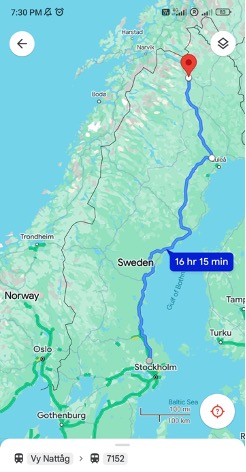
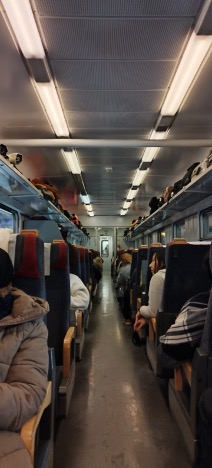
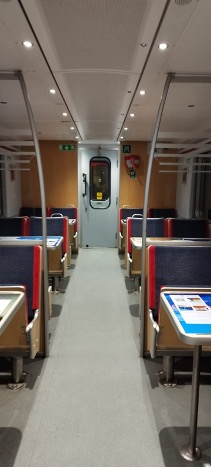
The journey was planned to last 14-15 hours from Uppsala to Kiruna and It was supposed to be a direct train with no transfer. Unfortunately, due to the extreme weather up to -30 in the north, the locomotive train could not proceed past Umeå-Boden, therefore we needed to transfer to another light-speed train Norrtåg at around 6 AM at Boden. The good thing is, that everything was announced quickly hours before midnight via email and SMS. We also get ticket replacement bookings for the second train. Overall, the train journey was pleasant and filled with a lot of students from everywhere! Unfortunately, there were not many views to see during the night other than the city train stations, nor during the early morning with the constant snowy forest. I safely reach Kiruna at 10 AM.
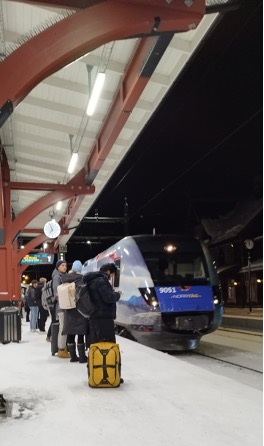
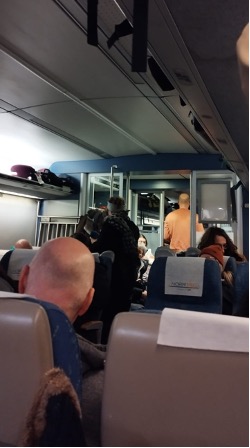
Arrived, Getting Picked, to the City Edge!
When we arrived at the train station, I was greeted by our tour organizer, and proceeded to put our bags in the car. There I also met another tour participant who went on the same train as us and took the same car. Along the way, our tour guide explained a lot about Kiruna City in general and how it was a super beautiful sunny winter day after a month of also no sunlight in Kiruna. Amazing insights: Kiruna city is collapsing every time due to iron mining activity. A lot of structures in the now-old city began to crack down and left behind. The government decided to move the city alongside its residences into the new city center which officially opened in 2022. The train station was also a temporary one mainly to transport iron goods. Other than the Mining Industry, the people in Kiruna are heavily involved in the city tourism itself.
Once we arrived at the city edge where the city road basically ends. We saw four snowmobiles with carriages and a storage shaft. We were given the option to change our shoes into a way proper winter boots leaving our current boots inside the storage. They also provide winter pants for better isolation if you happen to not wear proper winter pants. It was available for many ranges of shoe sizes and it was super helpful. I took the winter boots only since I already wore my Ski pants.
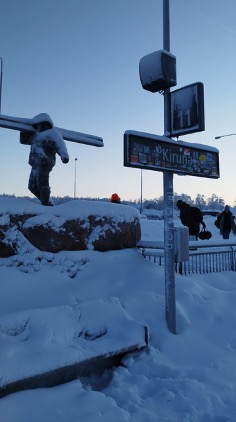
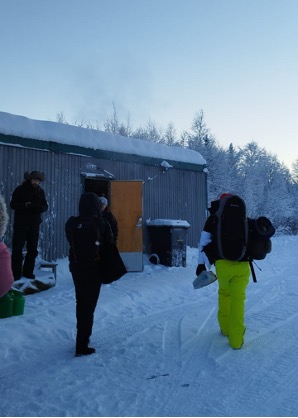

Snowmobiling Our Way!
After changing, we put our backpacks in one of the snowmobile carriages which is driven by our tour guide. Anyone who knows how to drive and has a driving license may be asked to help drive the other three snowmobiles to our cabin location which is around 10 KM. Meanwhile, the rest of the people will be on the carriage. It was super lovely with the sunlight shining through the way. We went to the forest, frozen swamps, and frozen rivers. We also saw some Moose footprints and wild wolves! Being outside in -28 with the wind breezing as we snowmobile definitely froze our senses, especially the feet! That is why, we occasionally made some stops along the way to heat up ourselves, moving our toes, and taking turns driving.
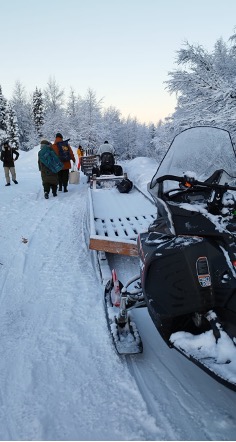
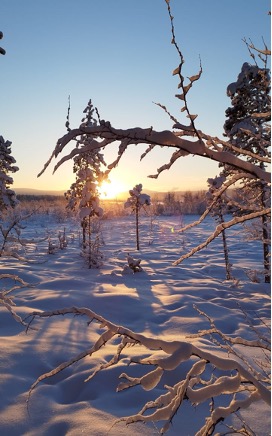
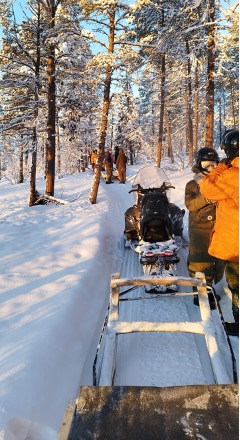
Arrived at the Cabin!
Once we arrived at 12 PM, we put our stuff in our cabin which is a traditional Sami hut with bunk beds and a seating area that is heated with a traditional wood-burning oven. Not long after that, we were asked to go to the main dining cabin for Moose Stew as lunch (they also provide a vegetarian option). There are multiple cabins with different purposes and also a dedicated cabin for compost toilet 🙂 A wild experience. (Pro tip: always bring tissue / wet tissue/hand sanitizer, will be handy!)
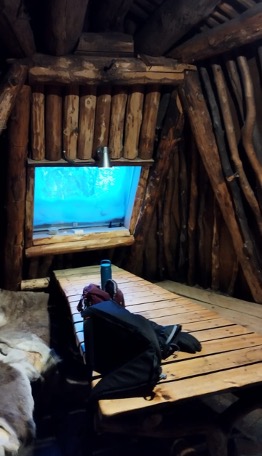
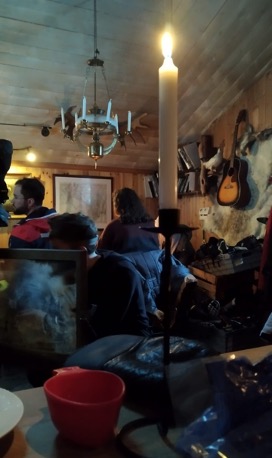
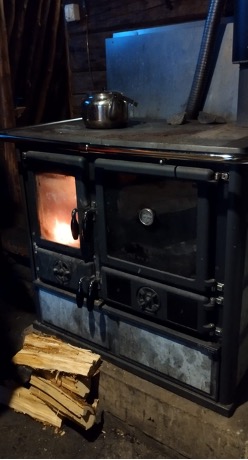
Basic Survival Lessons!
We were taught how to sew, axe, and chop the wood into smaller pieces and did some tag team to sew the big logs to provide our own cabin heat and also for the sauna! We were also taught on how to operate the oven and the sauna with safety precautions. After that, we went to the frozen riverside to also learn how to actually earn water by digging up the frozen lake and gathering the cold water with jugs that we transported to the cabin area again. It is said to be one of the cleanliest rivers on earth since no civilization along the river could tarnish it other than us. You could actually see the very clear river base since it wasn’t deep at all. Everyone got a chance to try to dip their hand in the frozen river in the water gathering sessions. It made my hand and finger numb from the cold for good minutes. We tried to finish all the preparations before running out of sunlight at around 3 PM. After that, we were asked to also book our sauna time (1 hour each per travel group) starting from 6 PM until 11 PM. There were 2 sauna pods, one by the river and one by the forest. I booked my Sauna time at 6 PM before our BBQ dinner at 7 PM. It was actually hard to heat up the Sauna to the maximum heat since we needed to keep the wood burning in the sauna oven and gain enough water vapors.
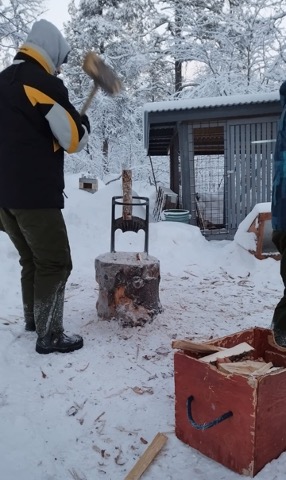
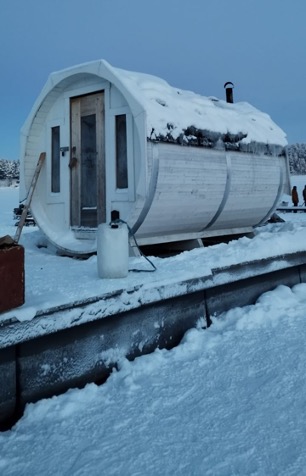
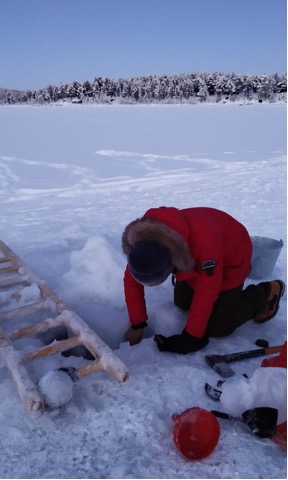
Dinner and Catching Aurora!
We were looking forward to our BBQ dinner in a special hut. It was sausages, corn, eggplant, rice, beans, marshmallow, and accompanied with marshmallow. Unfortunately, everything was frozen!!! It was still -16 inside the cabin and it was kinda unpleasant that all the food became a bit hard, the water and juices became fully frozen, and the sauces in the containers were all frozen. We decided to bring some leftovers to our sleeping cabin and heat up since the cold was too much to handle. After that, it was pretty much free time for everyone while taking turns getting on the sauna. Some brave souls even did an ice bath before the sauna. We spend the rest of the night waiting for the Aurora by sitting on the riverside. It was -30 constantly and we only lasted for 30 minutes outside, so we went back and forth to check out. All the people and the tour crew communicate via Whatsapp group so it’s super convenient to know schedules and notifications if someone is seeing the Aurora alongside the pictures. We waited until 11 PM according to the forecast. Unfortunately, Mother Nature was not on our side that night, it was hard to see it with naked eye. The Aurora was not that strong and you need a long exposure camera to really catch some greens out of it.
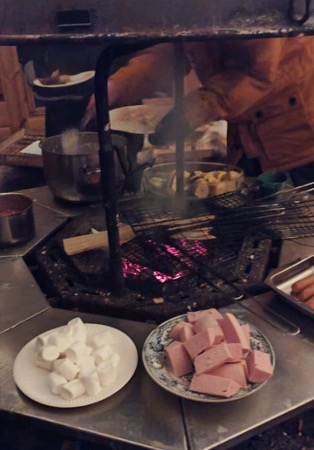


Rest and Start Early!
The cabin was still cold, but it was manageable with the duvet and layered clothes. (A sleeping bag is actually quiet handy if you cannot resist the cold). Since we were only there for one night, we tried to squeeze in as many activities as possible from early morning. The cabin provided us with a breakfast box containing bread, ham, butter, and some fruits for us to adjust ourselves. We walked through the riverside during sunrise and discovered that the river was slowly unfrozen in some parts, other people did Cross-country skiing, Air shooting, Sledding, and Ice Fishing. We had a good time taking pictures of the beautiful scenery around the cabin and wore special shoes to walk through frozen rivers. We found many moose trails but didn’t encounter one.
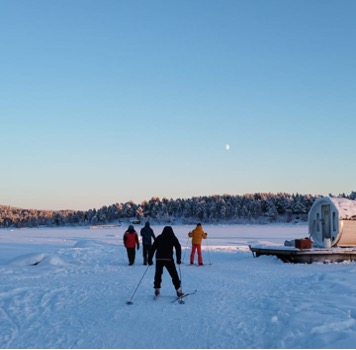


Going back to the city, Cancelled Train!
Around 2 PM we rode the snowmobile back to the city again. I tried the passenger seat this time. It was colder overall since we were heading back with the sun starting to set down. When we arrived back at the storage shaft, everyone scrambled inside the small shaft like sardines due to extreme freezing haha..We waited for our transport while changing the winter boots into our own shoes and returning them. Then we were picked up by car to the city train station not long after. Our Train back was supposed to be at 6 PM but we were told in the morning that it was canceled due to the extreme weather down to -30 and would be changed by bus replacement from Kiruna-Uppsala which was crazy to think about.
Surprisingly when we arrived by the train station, at 4 PM we got an announcement that the whole bus replacement was canceled due to not sufficient bus to carry all passengers from Kiruna that day. Our whole train transport was rescheduled to the next day morning. Fortunately not with busses. As compensation, we got a one-night hotel+breakfast buffet and 200kr dinner compensation from the company and everything was set down to the ticket replacement. I could not complain about the compensation given and was too tired to change the mode of transport either way, so most of the people traveling back that day also had the same experience as mine. I had to look for taxi from the train station to the hotel since it was quite far. Managed to share it with fellow tourists together. Once arrived, I took a good rest in the hotel and explored the new Kiruna city center a bit to shop for some souvenirs and snacks for the trip home tomorrow.

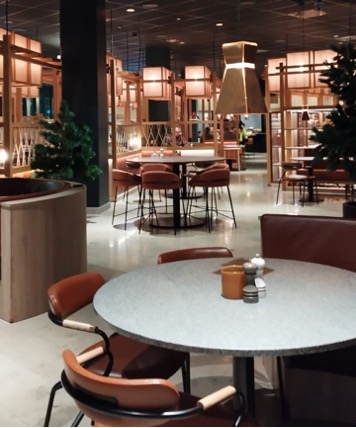
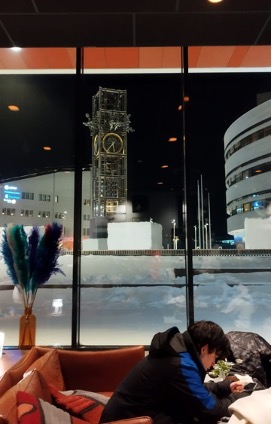
Finally Heading Back!
As another compensation, the train operator provided us with Bus transportation from the hotel to the train station around 9.45 to catch the train at 10.40. It was like a field trip with a bunch of tourists you did not know before so it was definitely a unique experience since we all suffered together from the cancellations together haha.. Unfortunately with the train going back to Uppsala, we needed to change 3 times from Kiruna – Umeå (6 hours) – Sundsvall (4 hours) – Uppsala (3 hours). It was a bit challenging to sleep with the constant changes and we were running out of proper meals and snacks. But after a long fiasco, I finally reached Uppsala around 12 AM! Thankfully the city bus was still available to my housing
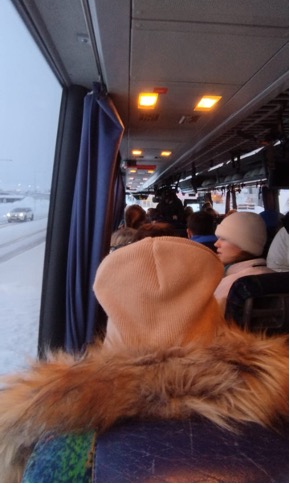
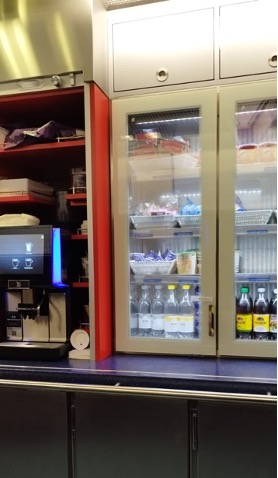
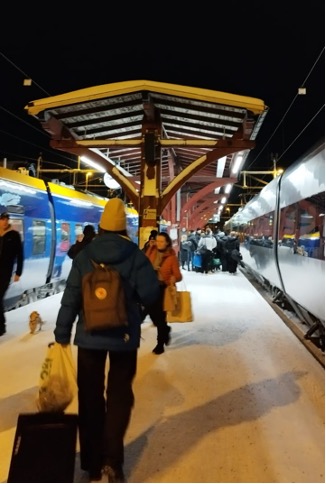
I definitely recommend this trip once in your lifetime to really submerge yourself in the winter wilderness! If you have extra time, you should also discover Abisko National Park one station from Kiruna, and definitely try another Aurora hunting together with friends will make it even more memorable.
Clothing Tips:
- 3 layers of clothes plus a hooded winter puff/ windbreaker jacket is basically enough. (Longjohn, Heattech Wool shirt, Sweater) Focus on the material.
- 3 layers of socks minimum and bring some extra in case your feet sweat a lot and frozen inside the winter boots
- Baklava underneath the Scarf is highly recommended to prevent frozen lips
- 2 Pair of gloves, (Smartphone touchable gloves, covered with thick mitten glove)
- Beanie hat and goggles since you will be outside for a long time

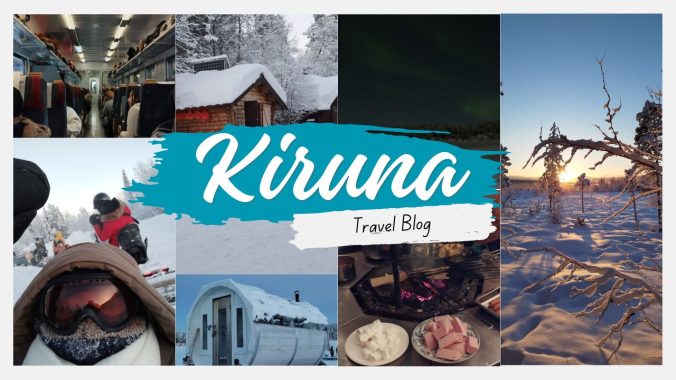
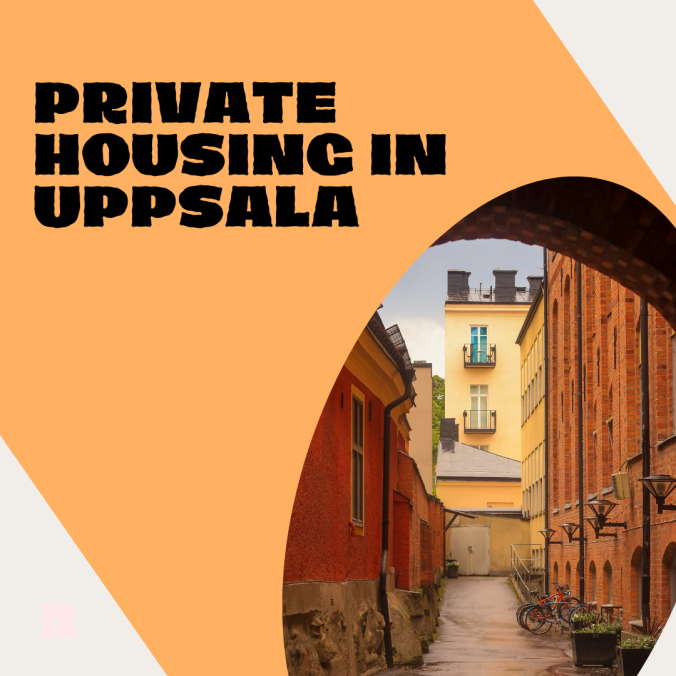
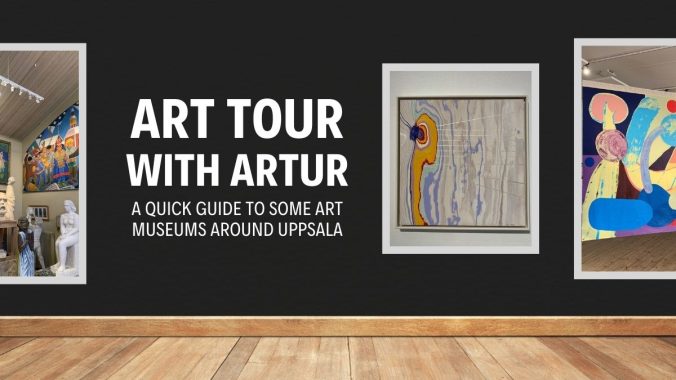
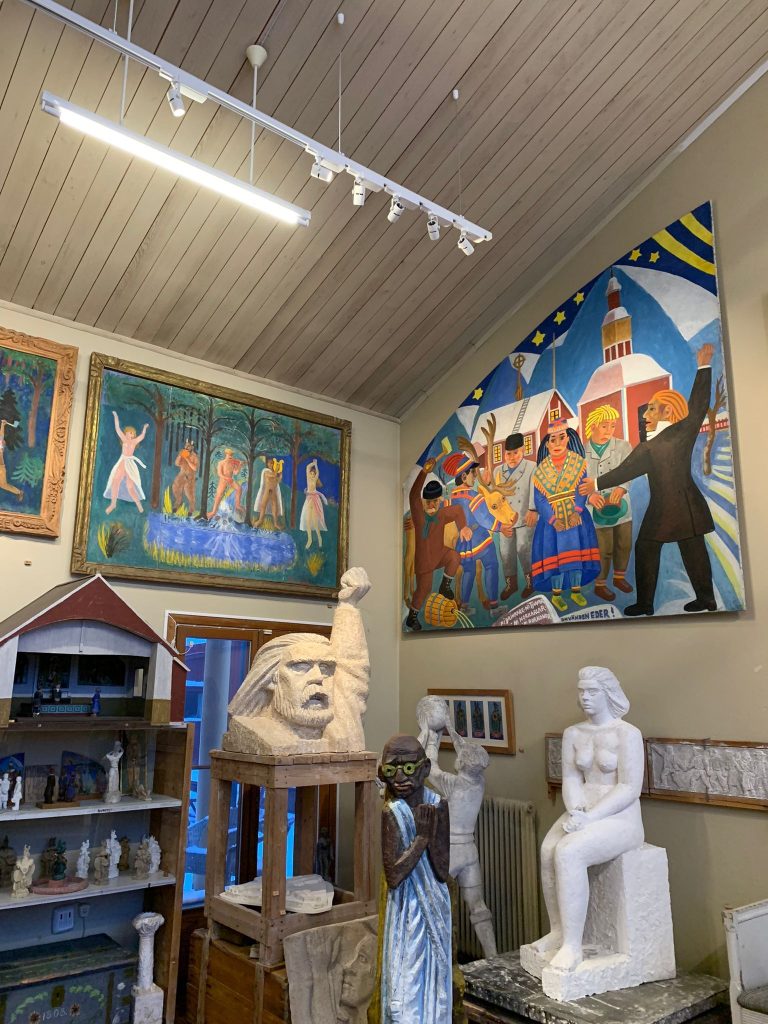
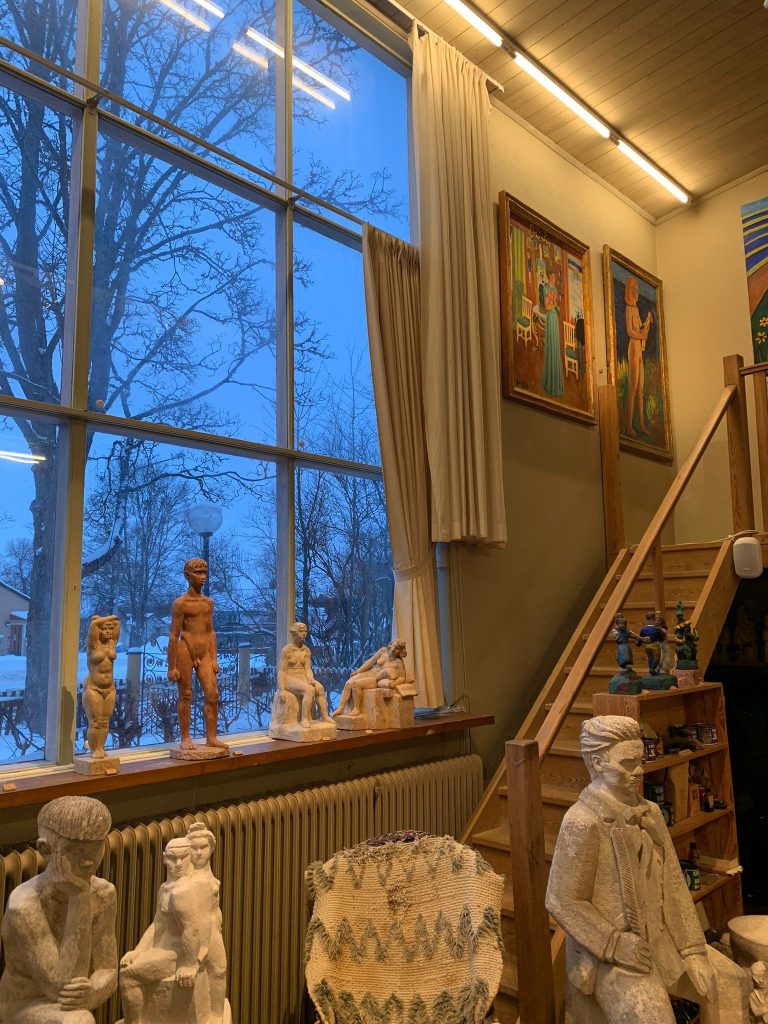
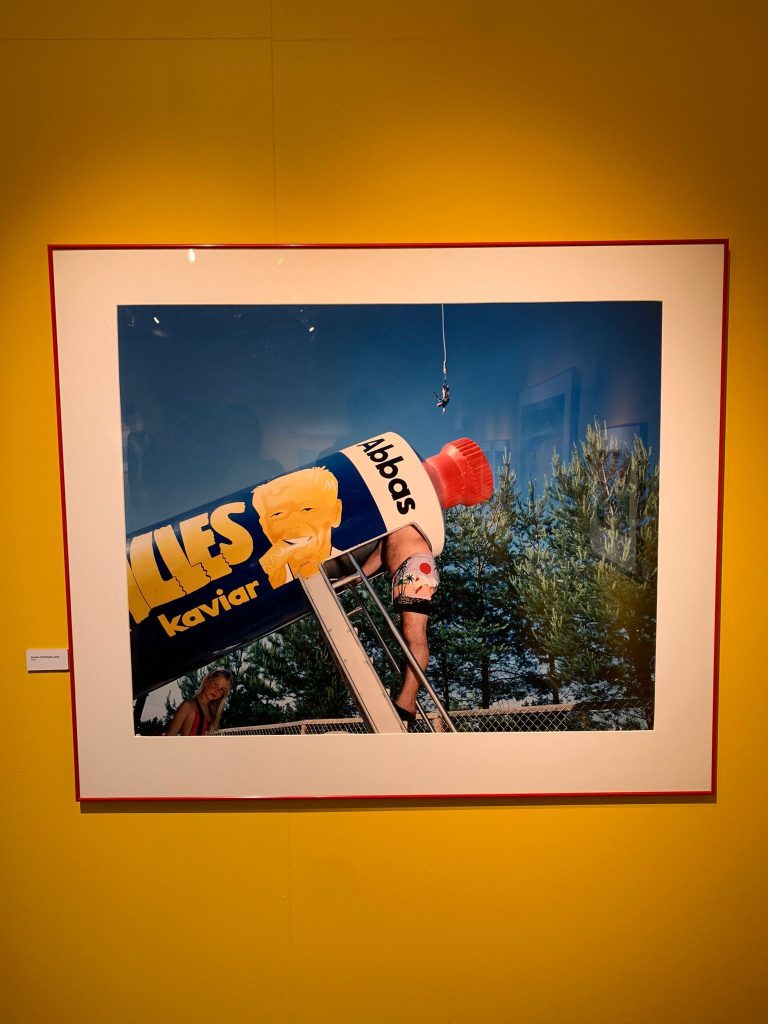
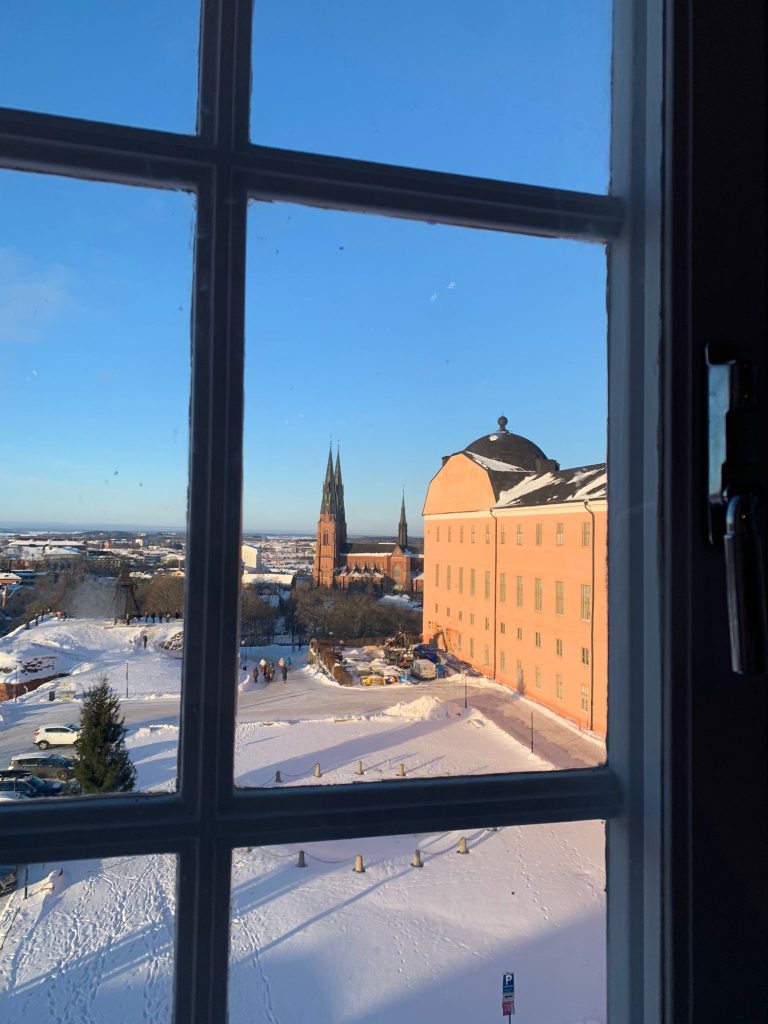
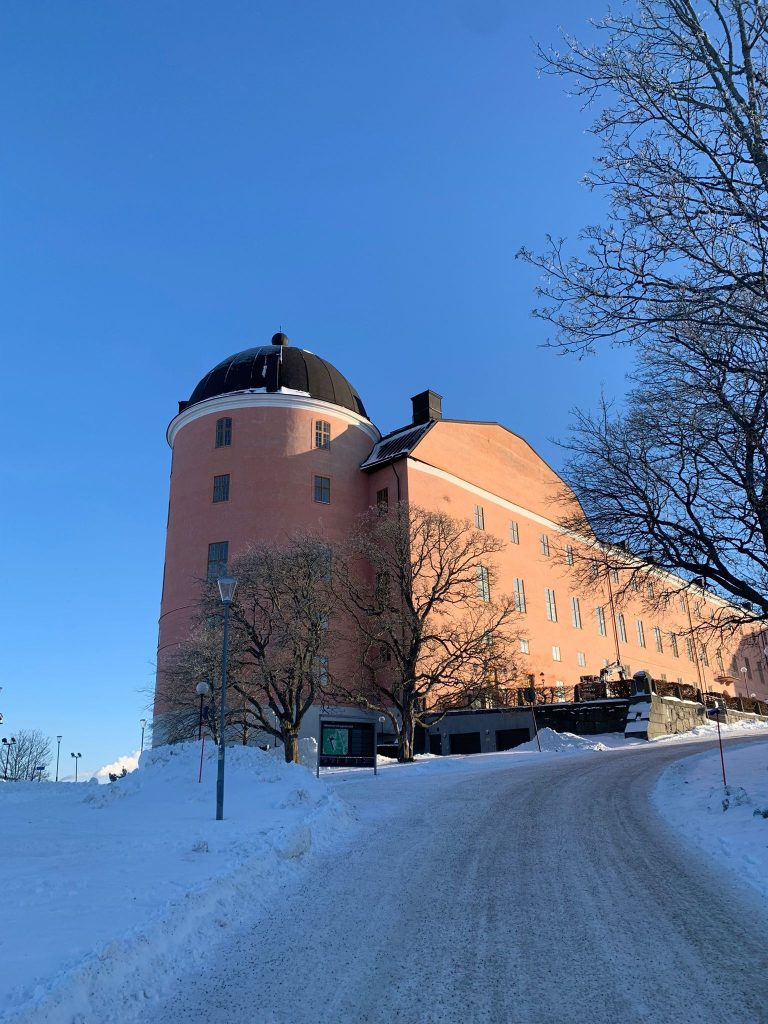
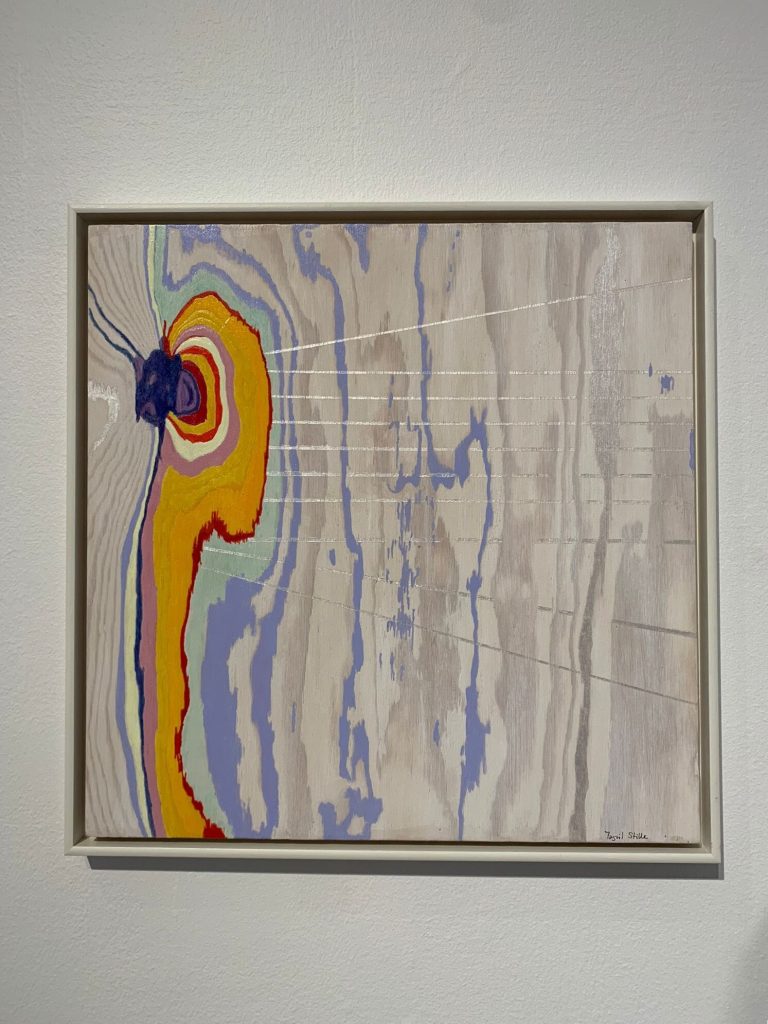
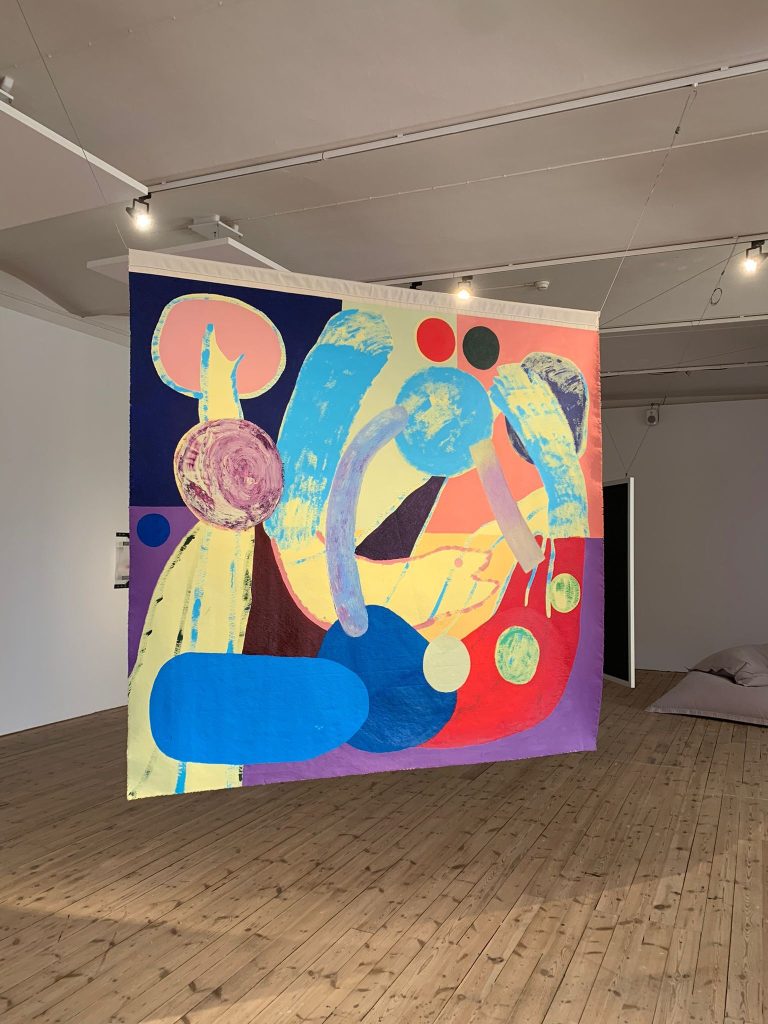

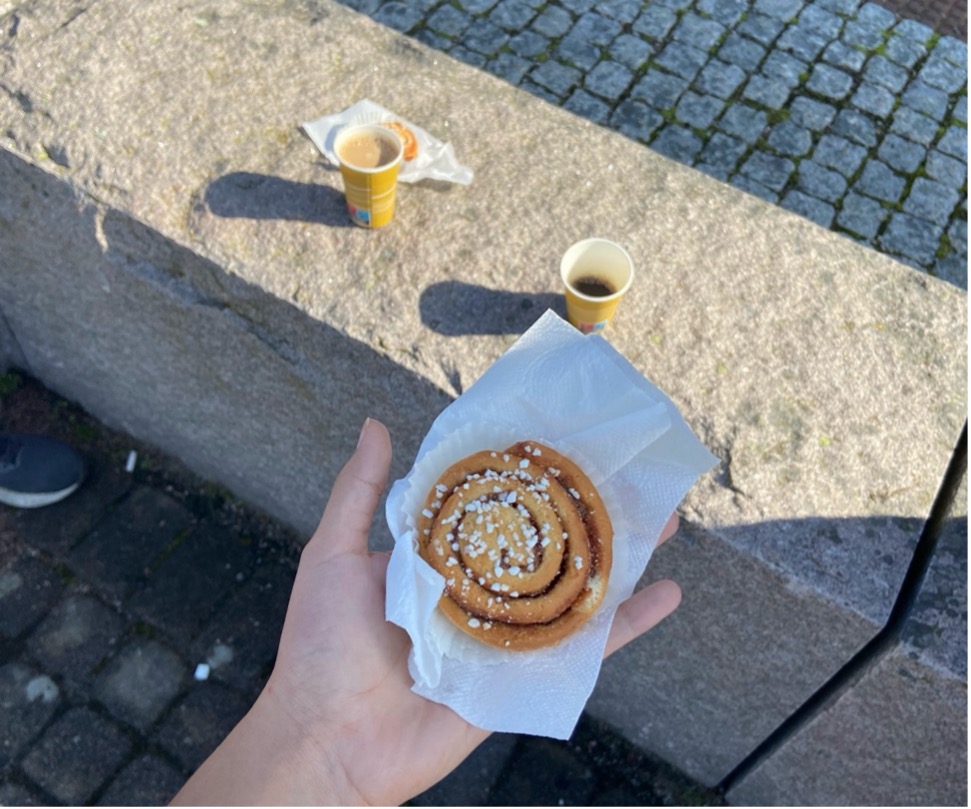
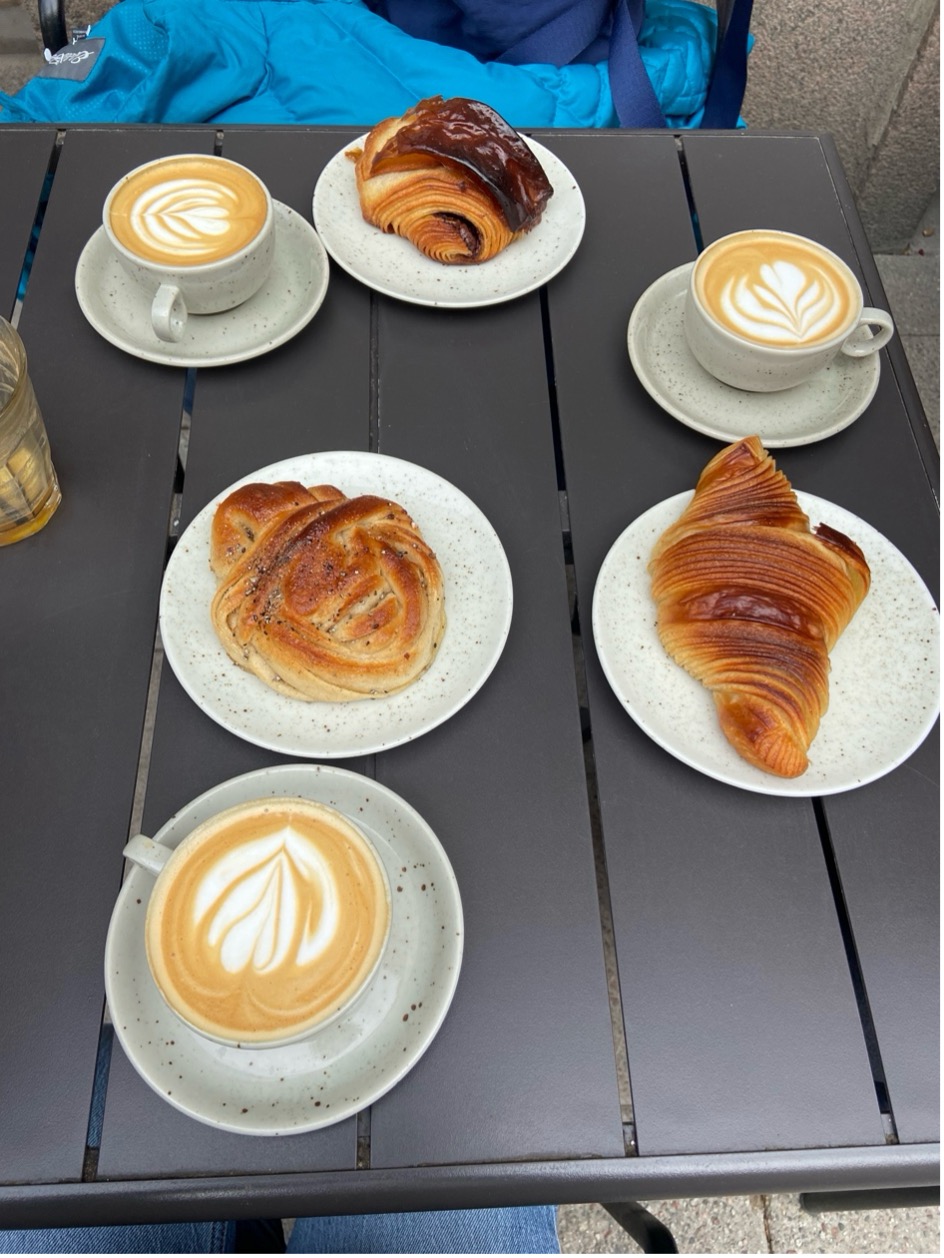


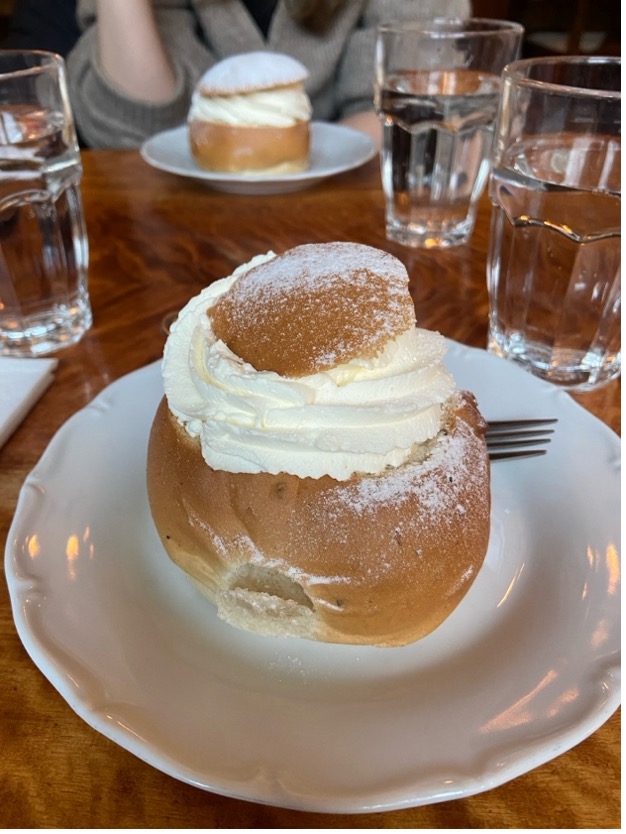
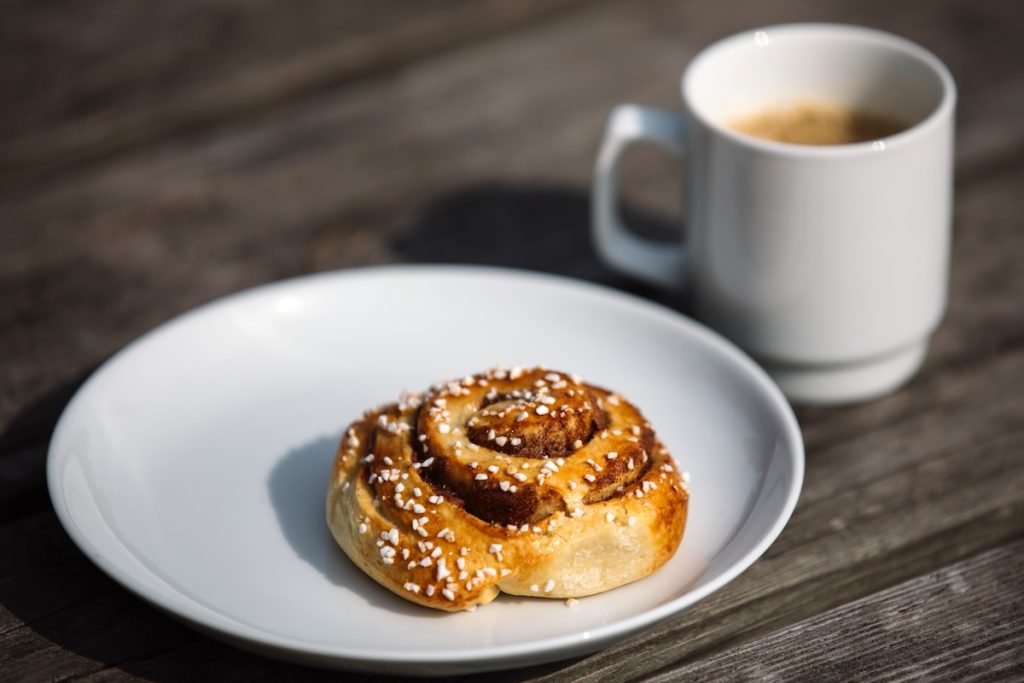
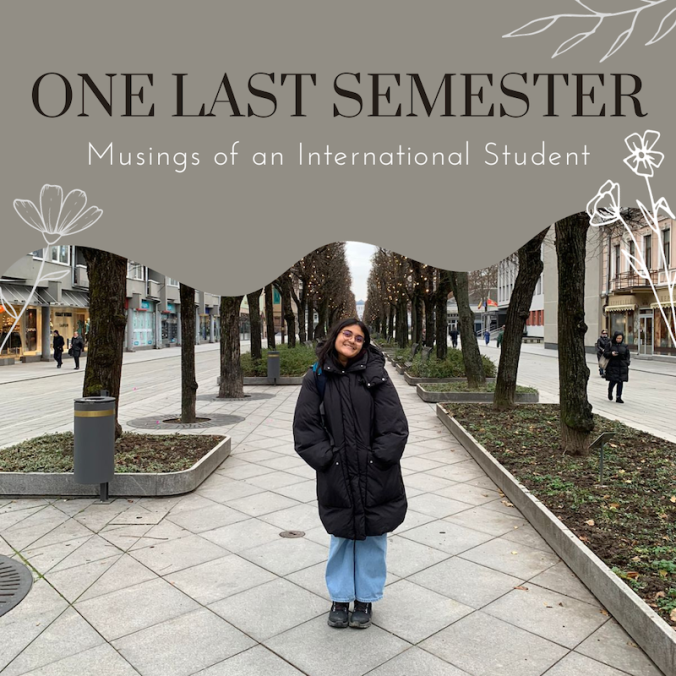
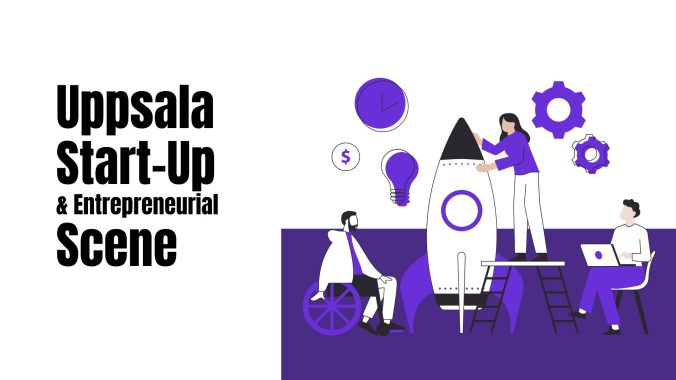
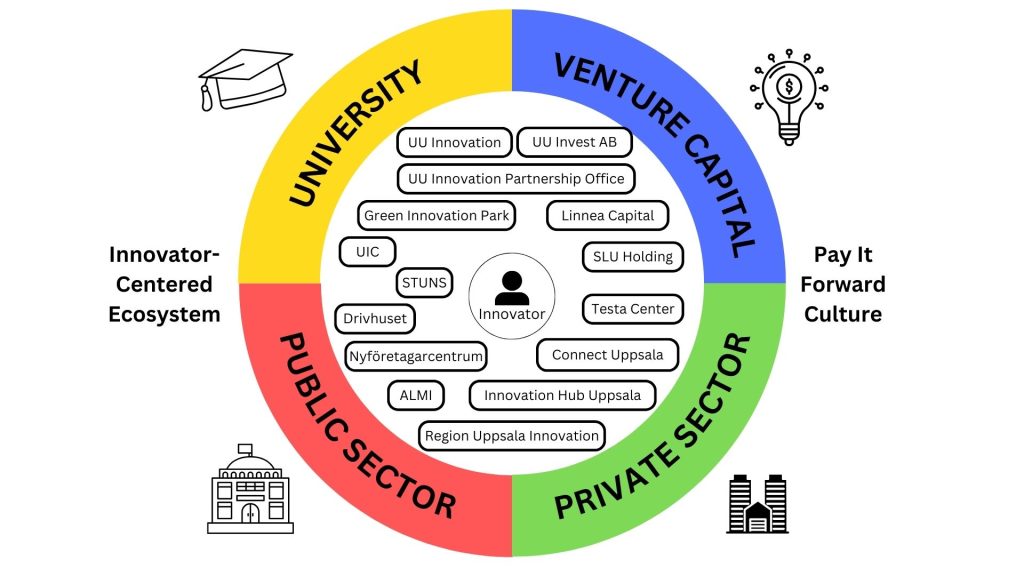
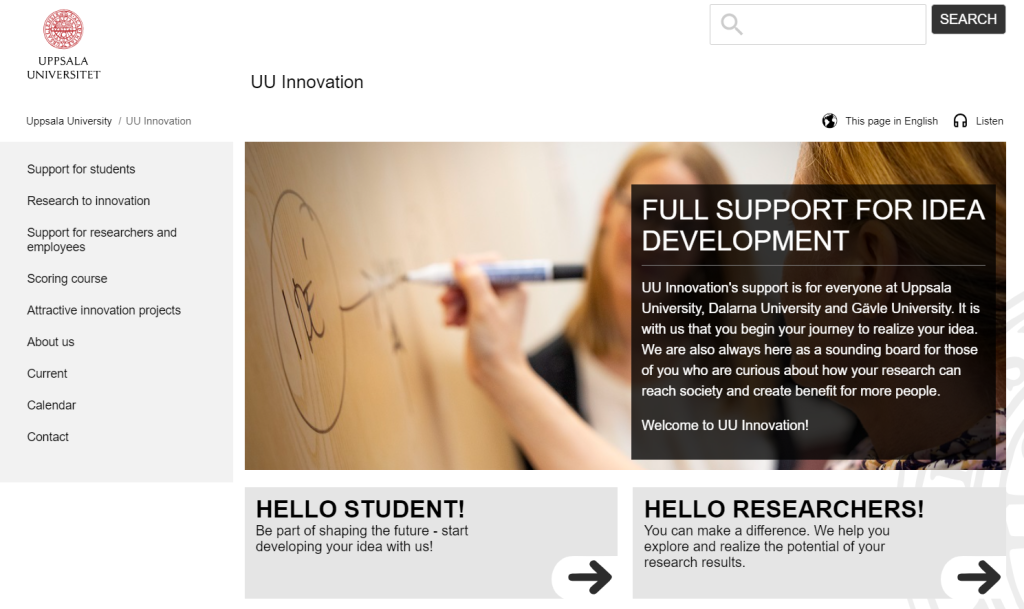

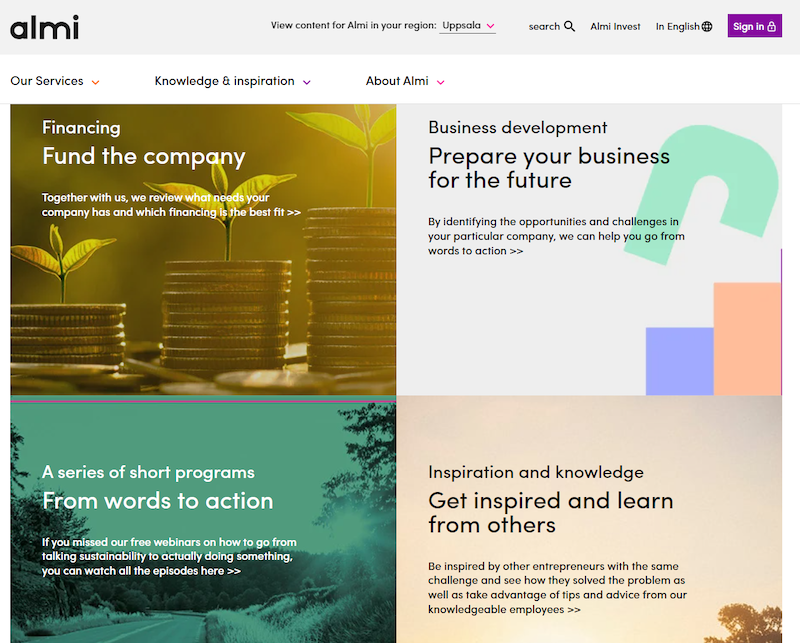
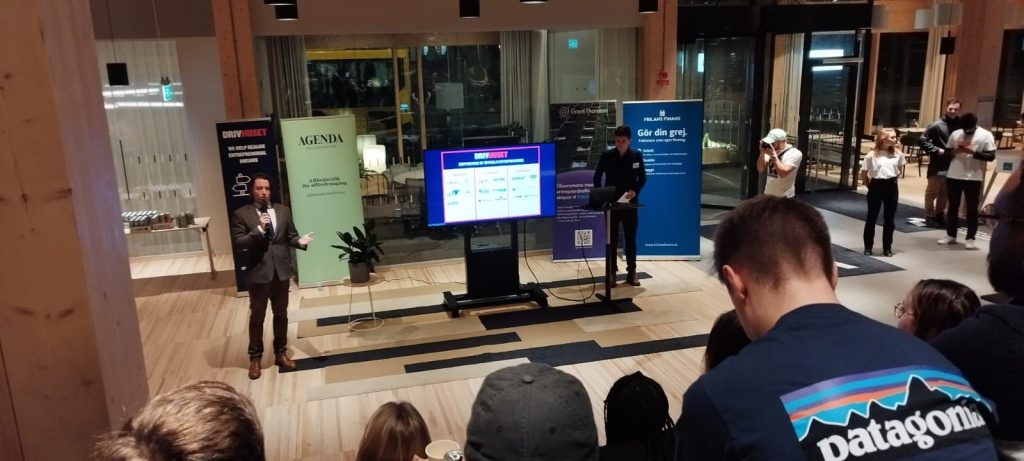
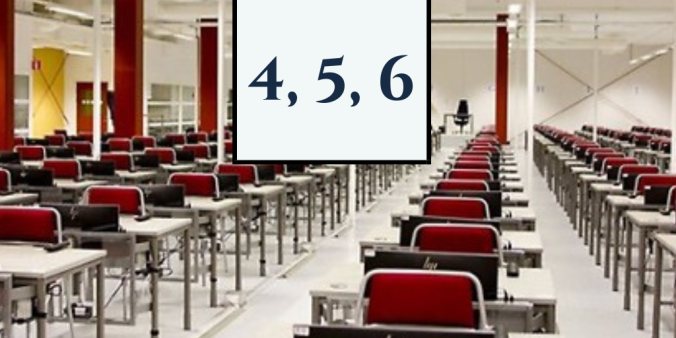
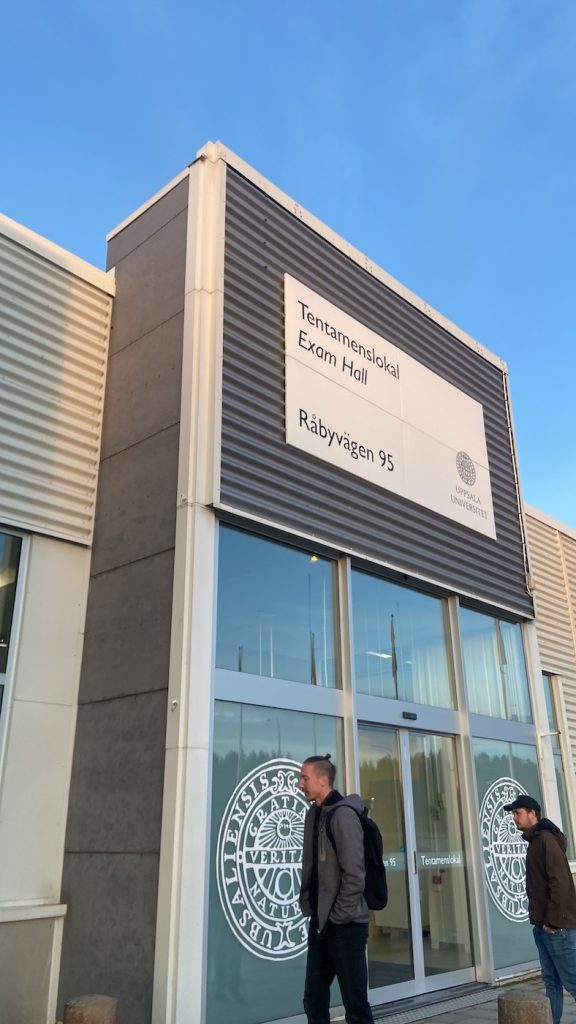
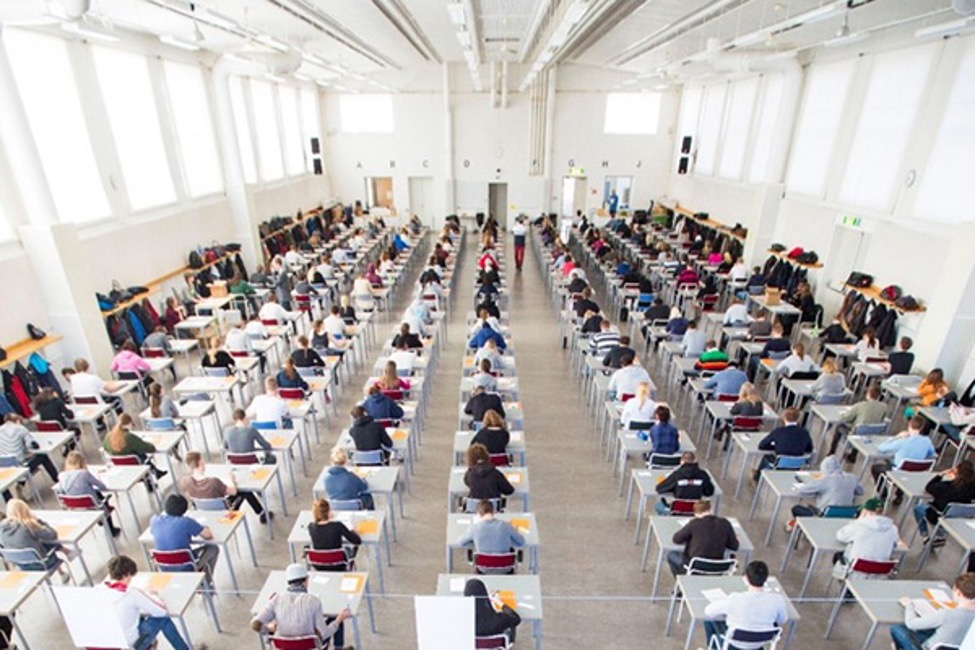
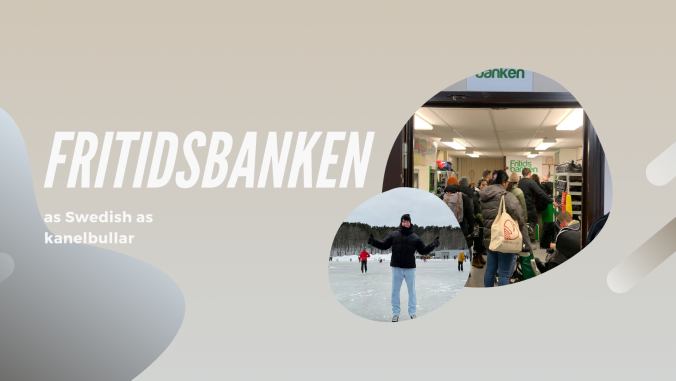
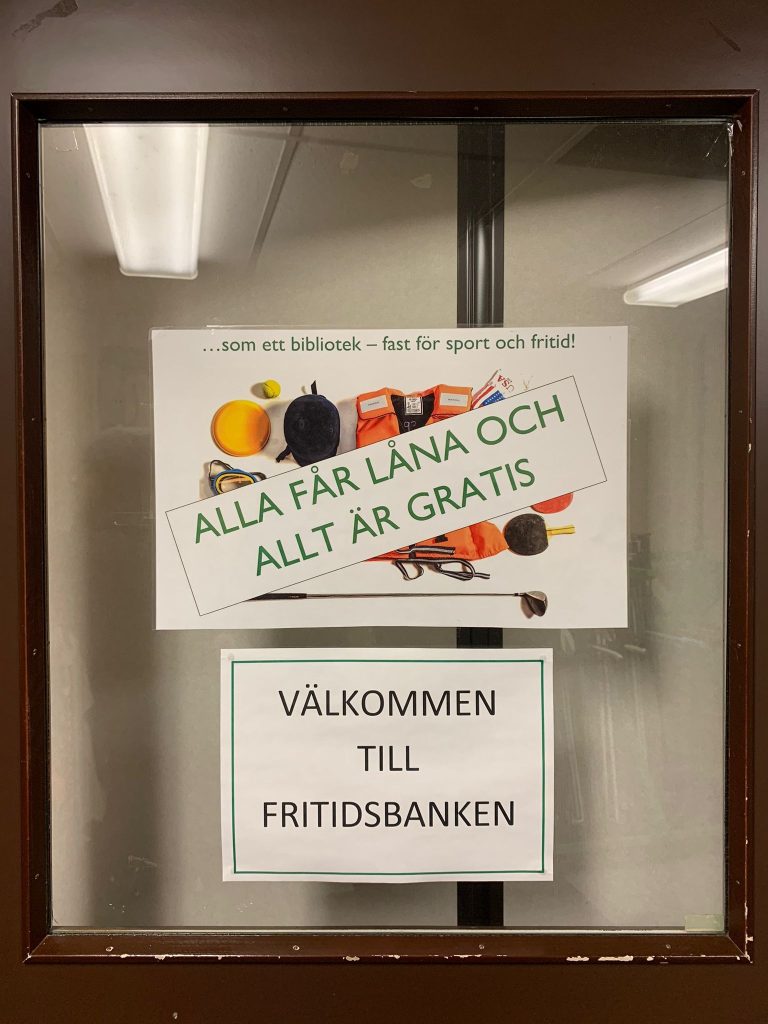
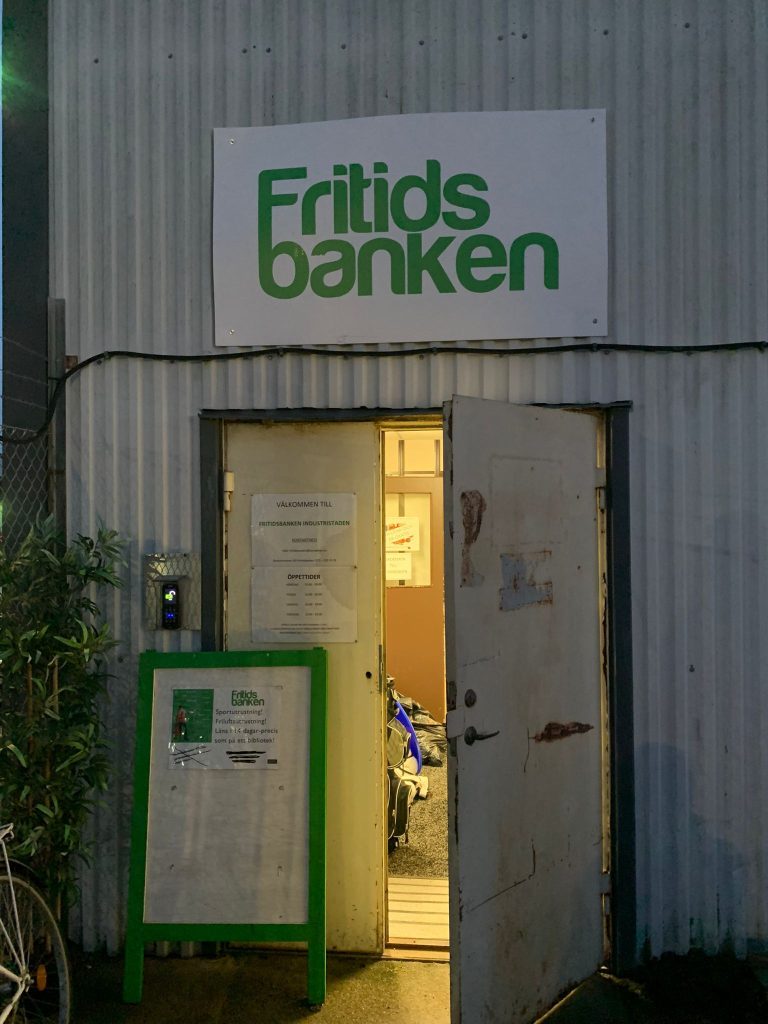
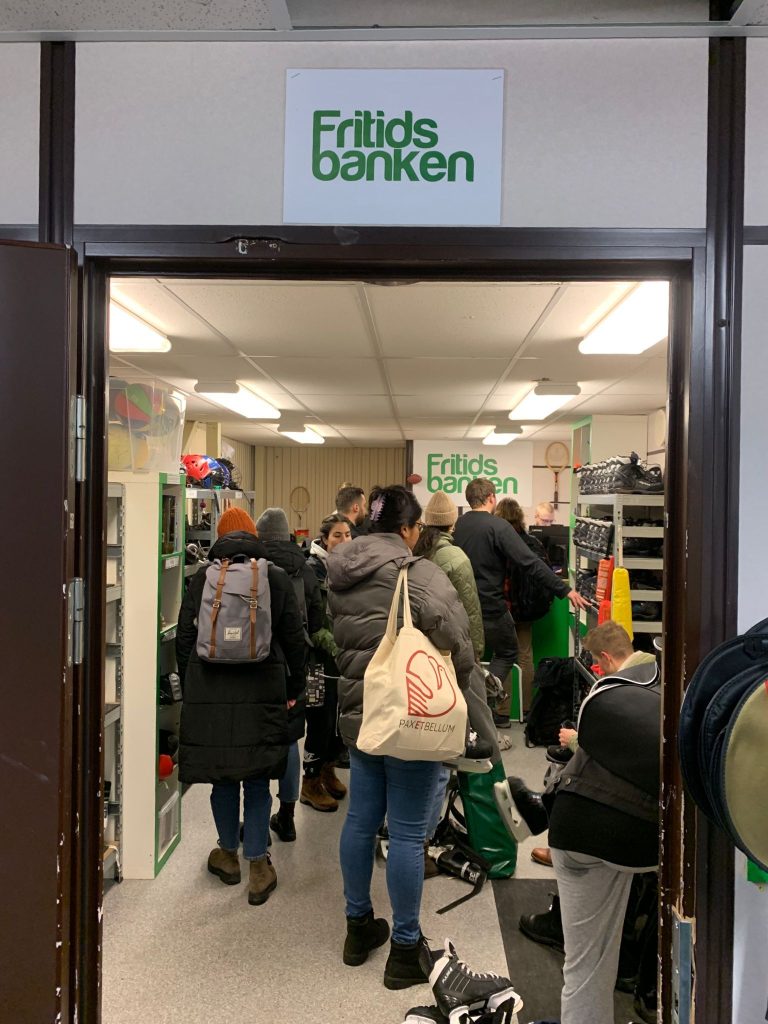

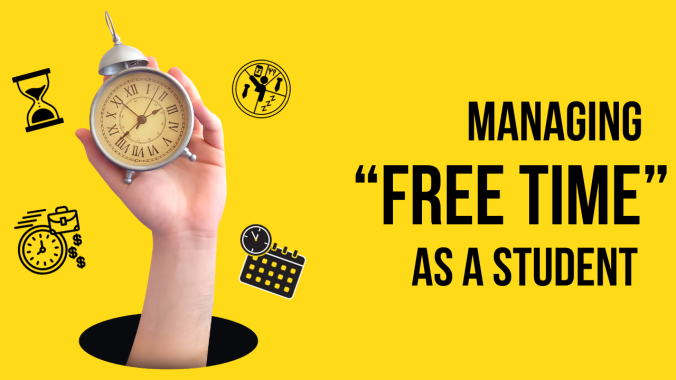
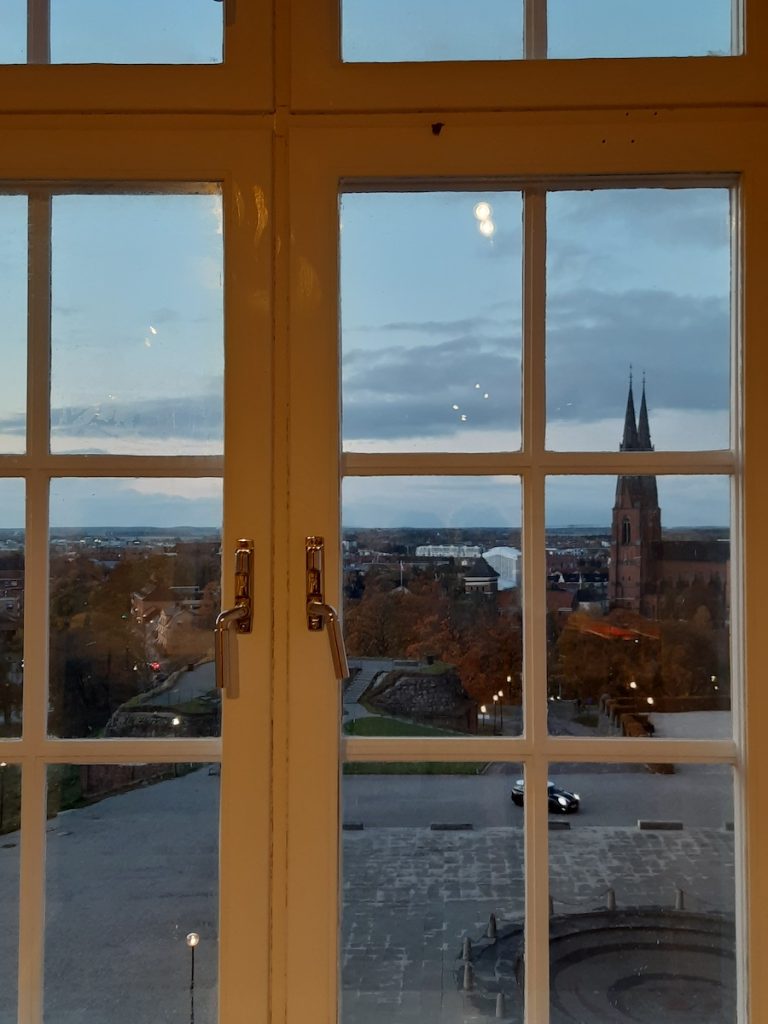
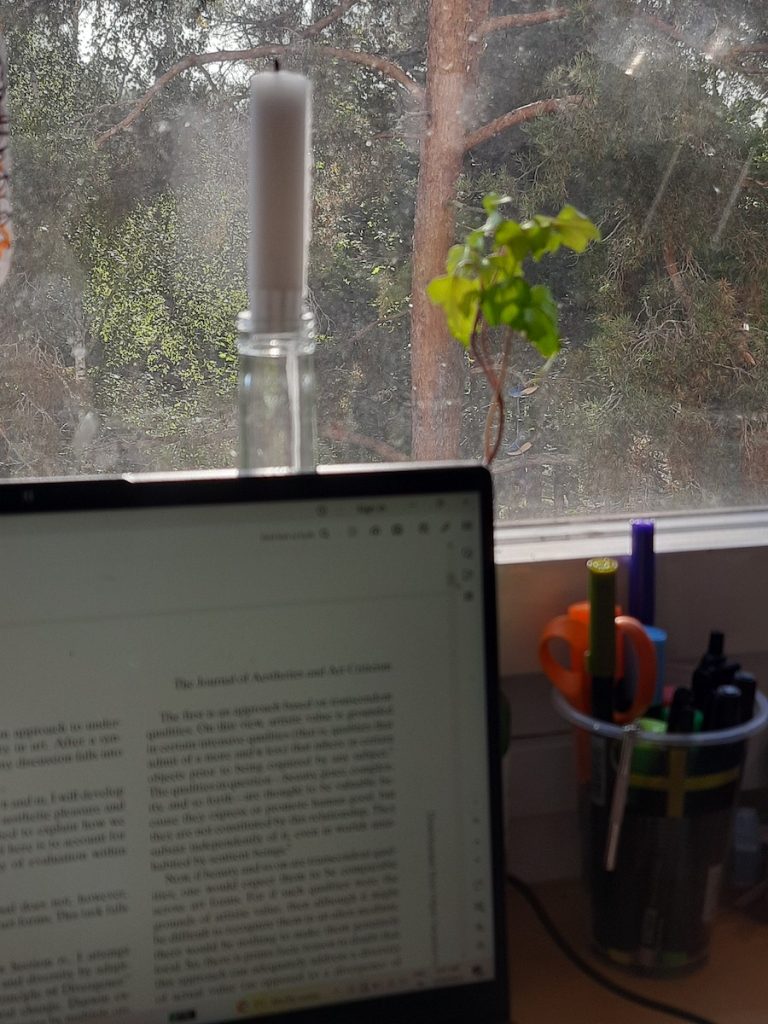
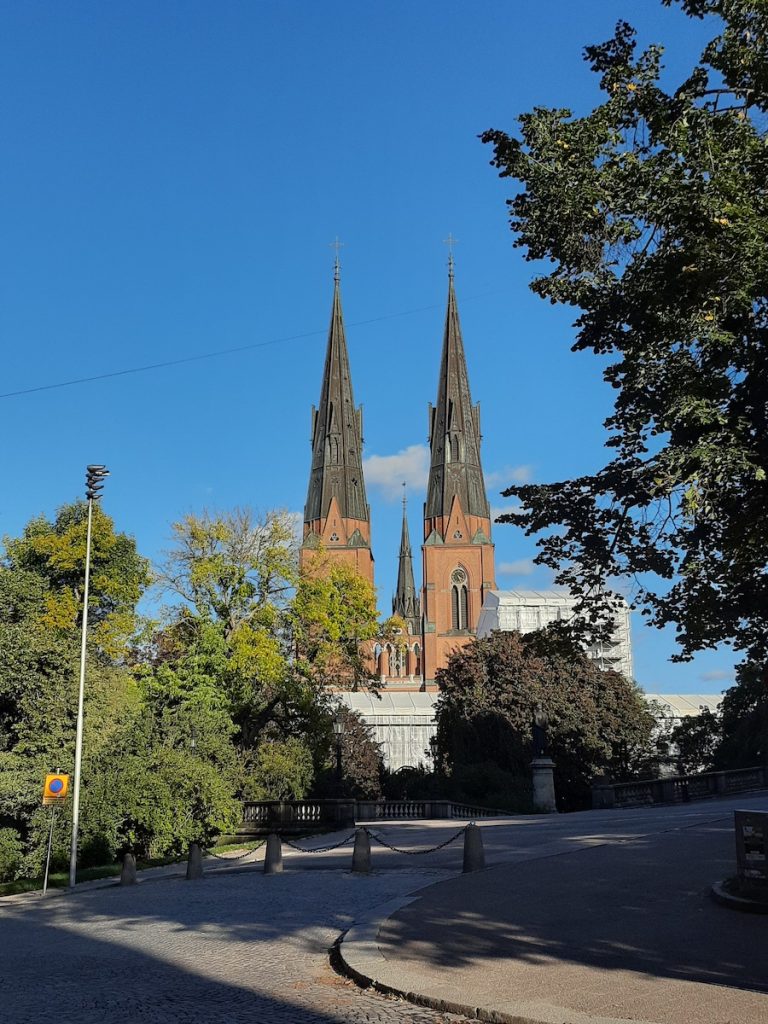
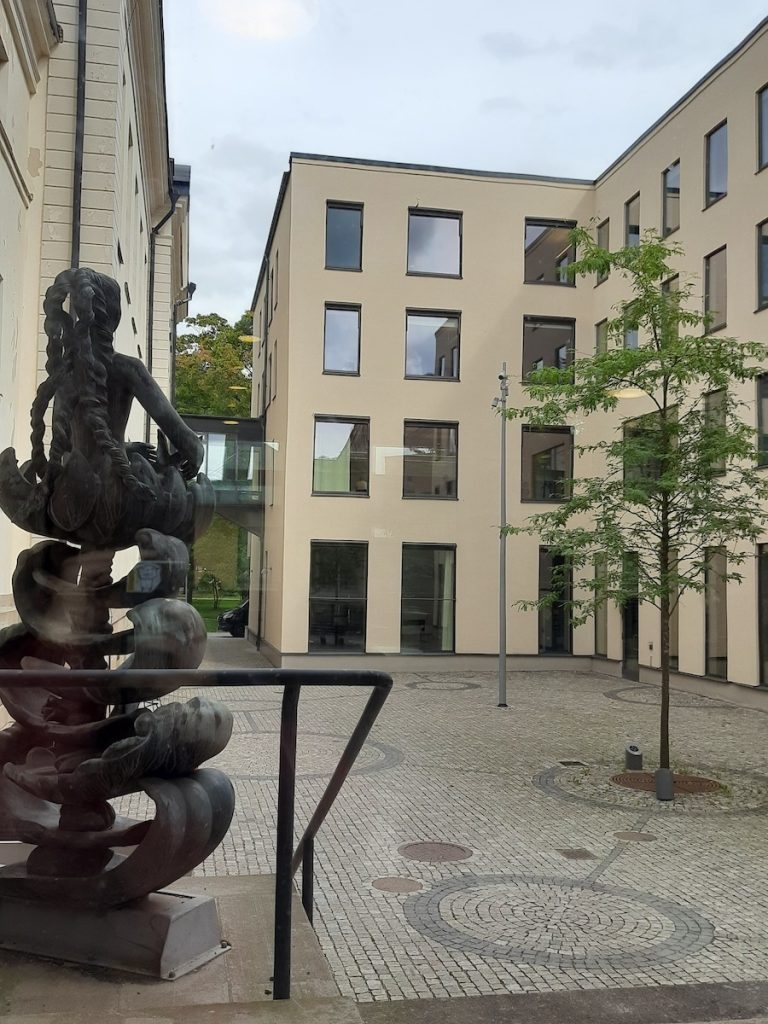
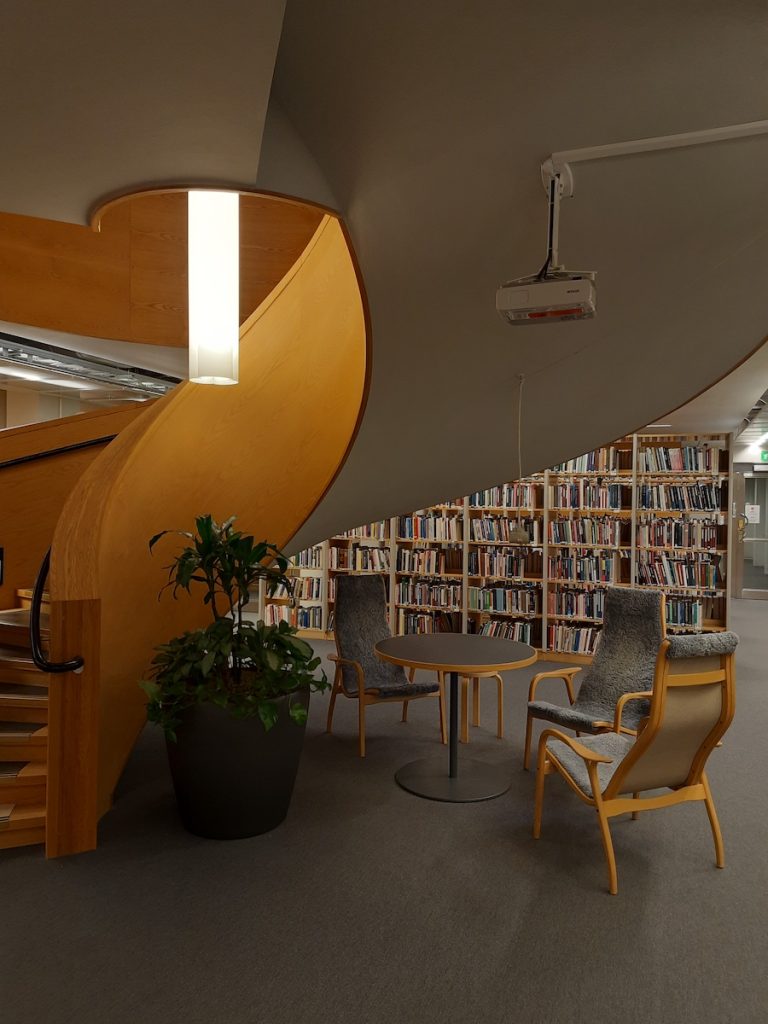
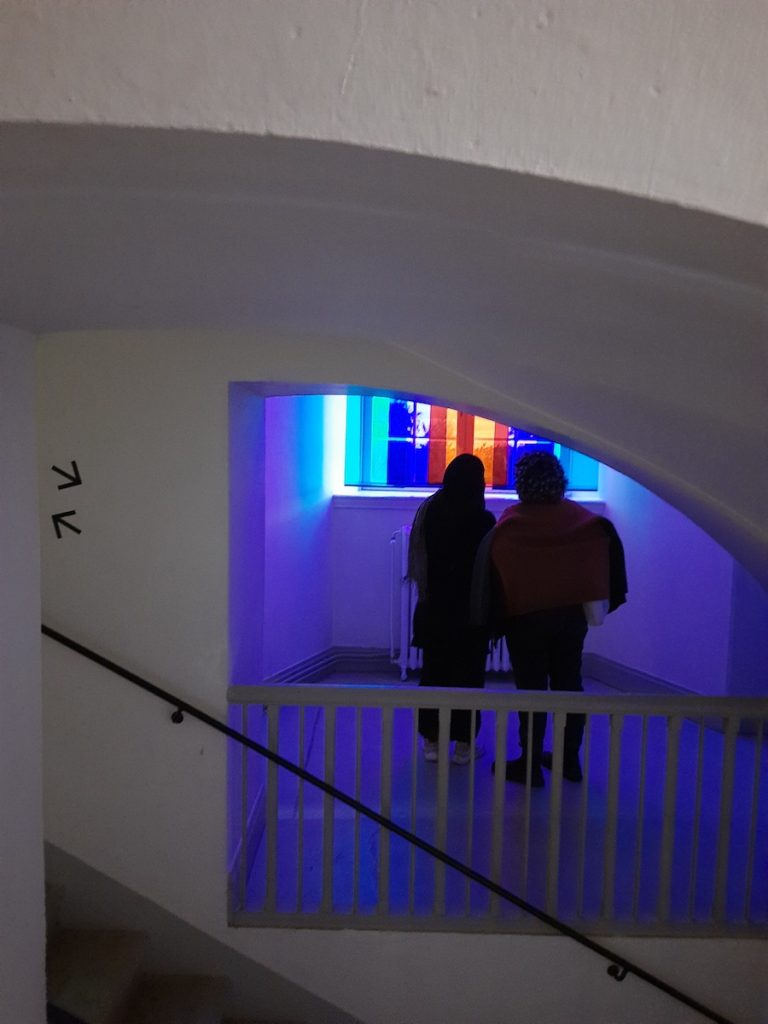

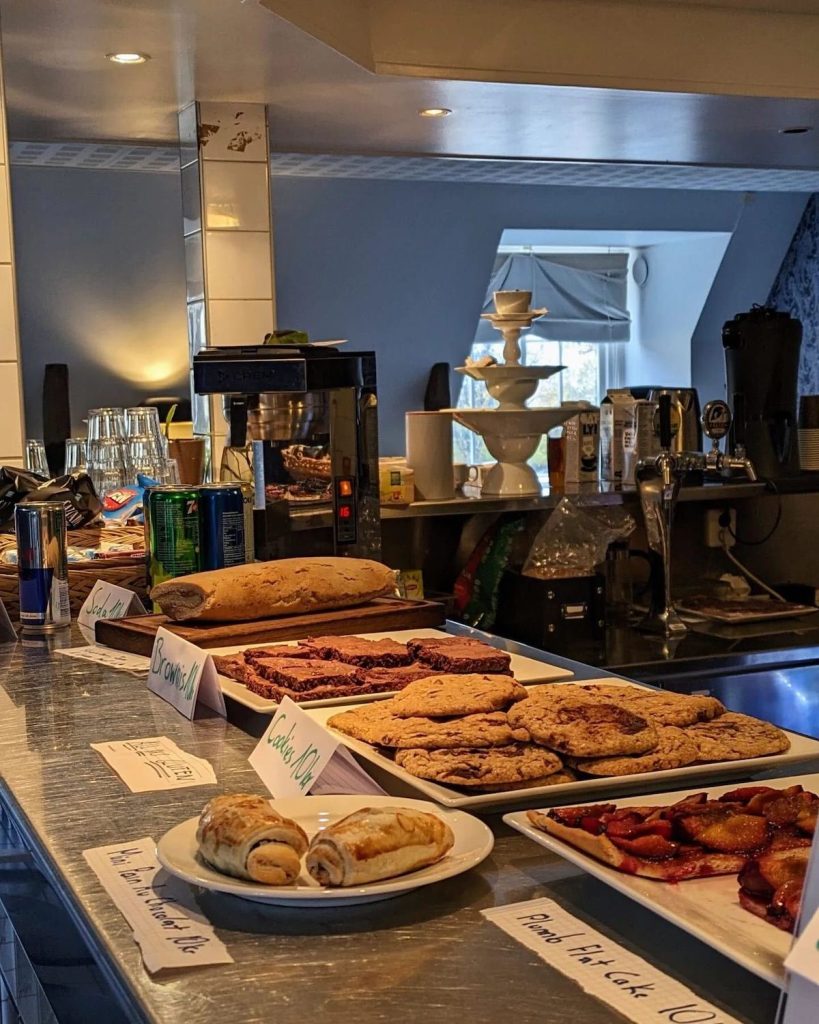
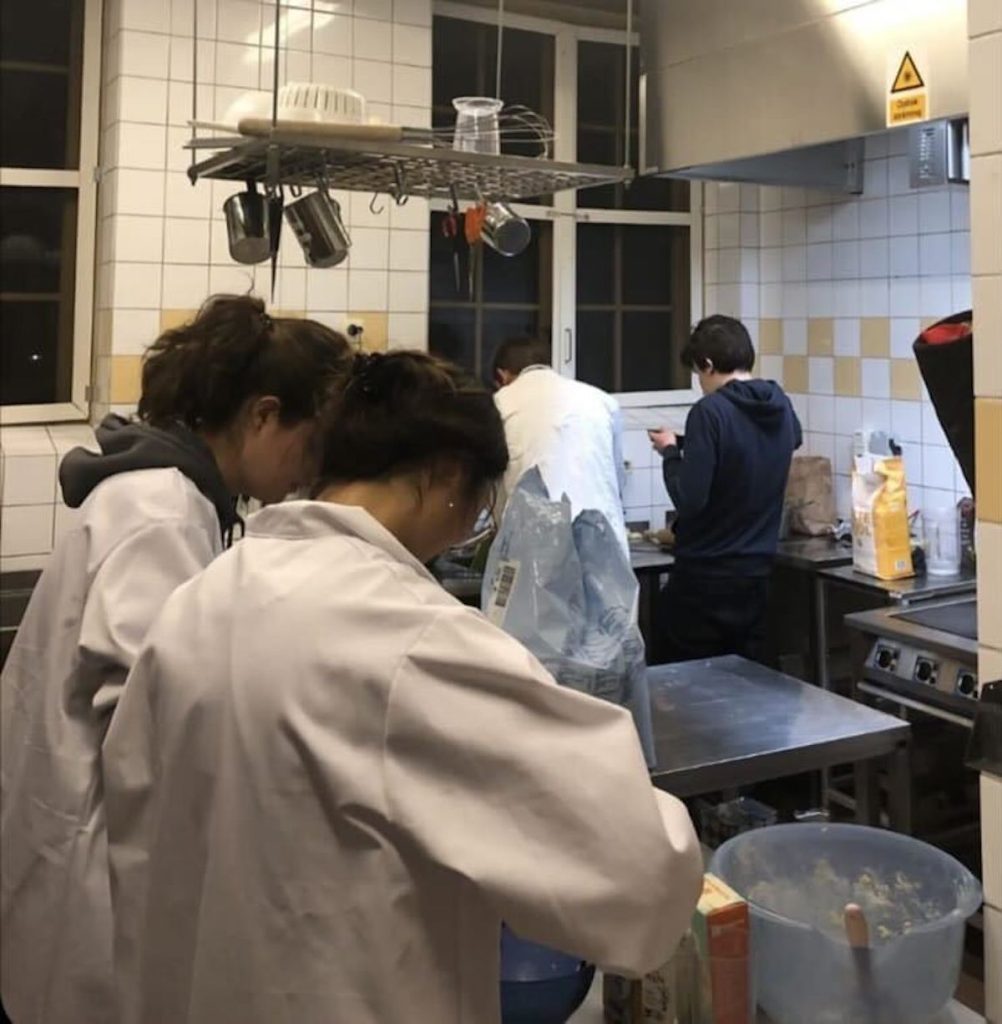
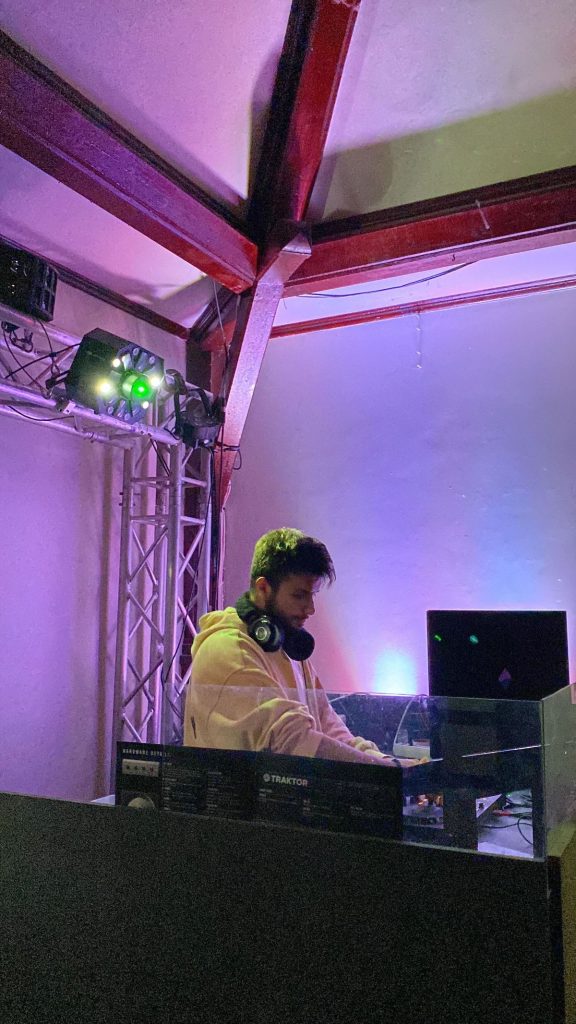

Recent Comments